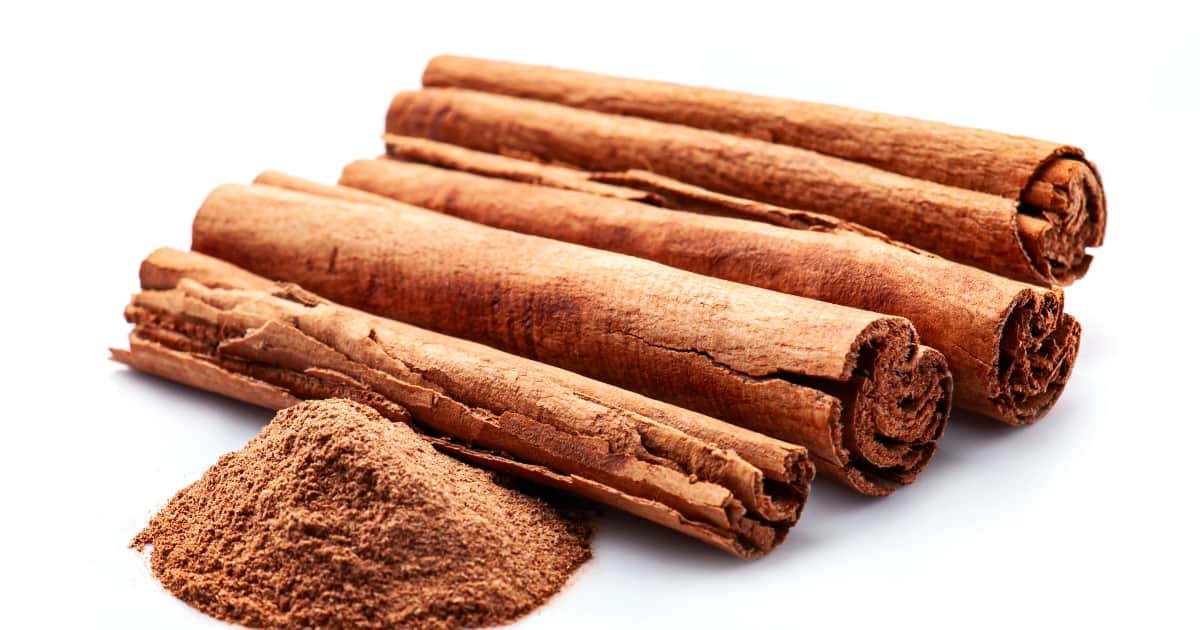Cinnamon is a precious spice used around the world to add warmth and sweetness to drinks, baked goods, breakfast foods, and more. But cinnamon powder is more than just a tasty addition to your recipes. It also packs some impressive nutritional benefits that make it well worth including in your diet.

Below you can find all the nutrition facts and health perks associated with cinnamon powder.
Cinnamon Powder Nutrition

Cinnamon comes from the bark of cinnamon trees. It is available in stick or powdered form, with the powder being the most convenient to use for cooking and baking. The cinnamon powder contains very few calories but is rich in fiber, manganese, calcium, and iron.
A single teaspoon of cinnamon powder has about:
- 6 calories
- 2 grams carbohydrates
- 1 gram fiber
- 26 milligrams calcium
- 0.2 milligrams iron
Cinnamon gets its distinct flavor and aroma from compounds like cinnamaldehyde, eugenol, and coumarin. It also contains polyphenols that act as antioxidants in the body. In addition to being antimicrobial and anti-inflammatory, these antioxidants are thought to be behind many of cinnamon's health benefits.
Now let's explore the complete nutritional profile:
| Nutrient | Amount (per 1 tsp) | % Daily Value |
|---|---|---|
| Calories | 6 | 0% |
| Total Fat | 0g | 0% |
| Sodium | 0.3mg | 0% |
| Total Carbs | 2.1g | 1% |
| Dietary Fiber | 1.4g | 5% |
| Sugar | 0.1g | |
| Protein | 0.1g | 0% |
| Calcium | 26.1mg | 2% |
| Iron | 0.2mg | 1% |
| Potassium | 11.2mg | 0% |
| Manganese | 0.5mg | 20% |
| Vitamin K | 0.8mcg | 1% |
Detailed Nutrition Facts for Cinnamon Powder
Cinnamon powder is low in calories but high in fiber and key micronutrients like manganese, iron, and calcium. Here is the full scoop on the nutrition facts for a 1-teaspoon serving of cinnamon powder:
Macronutrients
- Total calories: 6
- Total fat: 0 grams
- Total carbs: 2 grams
- Fiber: 1 gram
- Sugar: 0 grams
- Protein: 0 grams
As you can see, cinnamon powder is very low in fat, carbs, and protein. Its main macronutrient contribution is fiber, providing 5% of the Daily Value in just 1 teaspoon.
The fiber in cinnamon powder is mostly insoluble fiber, meaning it adds bulk to stool and promotes regularity. This can aid digestion and prevent constipation.
Micronutrients
- Calcium: 26 milligrams (2% DV)
- Iron: 0.2 milligrams (1% DV)
- Potassium: 11 milligrams (0% DV)
- Vitamin K: 0.8 micrograms (1% DV)
- Manganese: 0.5 milligrams (20% DV)
Cinnamon powder really shines when it comes to its micronutrient content. Just one teaspoon provides a good amount of manganese, iron, and calcium.
Manganese supports bone health and metabolism. Iron transports oxygen throughout the body. Calcium strengthens bones and teeth.
Cinnamon powder also contains traces of other micronutrients like magnesium, phosphorus, and vitamins A, E, and B6. It provides no vitamin C, vitamin D, or vitamin B12.
Potential Health Benefits of Cinnamon Powder
Beyond its nutritional value, cinnamon powder has been associated with some important health benefits. Here are some of the top ways this flavorful spice may enhance your wellbeing:
May Help Control Blood Sugar
Multiple studies have found cinnamon powder can reduce blood sugar levels and increase insulin sensitivity. This suggests cinnamon may be protective against diabetes.
Its anti-diabetic effects likely come from its ability to mimic insulin and activate insulin receptors in the body. Using cinnamon long-term may help control blood sugar spikes.
Packed With Antioxidants
The polyphenols in cinnamon act as antioxidants that can neutralize unstable free radicals and prevent oxidative damage. This antioxidant effect may bolster immunity and protect against chronic disease.
Test tube and animal studies show cinnamon neutralizes free radicals, inhibits lipid peroxidation, and limits nitric oxide production to suppress inflammation.
May Reduce Heart Disease Risk
Heart disease remains a leading cause of death worldwide. Luckily, cinnamon powder may help reduce major risk factors like high cholesterol and hypertension.
Research indicates cinnamon can lower total cholesterol, LDL "bad" cholesterol, and triglycerides while raising protective HDL "good" cholesterol. It also shows promise for reducing high blood pressure.
Could Protect Brain Function
There's some evidence cinnamon may defend against cognitive decline and neurodegenerative diseases like Alzheimer's and Parkinson's.
According to animal research, cinnamon combats tau aggregation in the brain - a hallmark of Alzheimer's progression. It also limits oxidative damage that can destroy neurons and brain tissue.
May Fight Cancer
Emerging research suggests cinnamon powder possesses potent anti-cancer activities that may help reduce tumor growth and proliferation.
Specific compounds in cinnamon powder have been shown to block blood vessel formation in tumors while inducing cancer cell death. More research is needed to confirm its cancer-protective effects.
How Much Cinnamon Powder Should You Eat?
Cinnamon powder is safe to consume in normal culinary amounts. Most healthy adults can safely enjoy up to 1 teaspoon (2.5 grams) daily.
Higher doses may be problematic since cinnamon contains coumarin, a naturally occurring compound that can damage the liver in high amounts. The tolerable daily intake of coumarin is 0.1 mg per pound of body weight.
Stick to using cinnamon powder as a seasoning rather than taking it in supplement form, which may provide extremely high doses. And opt for Ceylon rather than Cassia cinnamon powder, as Ceylon contains much less coumarin.
Tips for Adding Cinnamon Powder to Your Diet
Here are some easy ways to start reaping the nutritional rewards of cinnamon powder:
- Sprinkle on oatmeal, yogurt, cottage cheese, or fruit for breakfast
- Mix into coffee grounds before brewing for cinnamon-flavored coffee
- Add to smoothies along with cocoa powder for a sweet cinnamon-chocolate flavor
- Combine with sugar as a topping for toast, pancakes, or waffles
- Stir into almond milk with ginger for a warming evening drink
- Toss with roasted sweet potatoes, winter squash, or apples
- Mix into chocolate protein balls or energy bites for an antioxidant boost
- Stir into plain Greek yogurt with maple syrup for a simple dip or sauce
- Add to curries, stews, soups, and savory baked goods
Cinnamon powder is endlessly versatile in both sweet and savory recipes. Start with a teaspoon at a time until you find the right amount for your taste preferences.
FAQs
Is cinnamon powder good for weight loss?
Cinnamon powder can support weight loss efforts in a few ways. First, it adds flavor to foods and beverages so you can cut back on added sugar. It also promotes feelings of fullness thanks to its fiber content. Additionally, by stabilizing blood sugar levels, cinnamon powder may curb cravings and overeating.
Does cinnamon powder have any side effects?
When consumed in normal food amounts, cinnamon powder is very safe for most people. However, taking too much may cause side effects like mouth sores, low blood sugar, breathing issues, and liver damage. Start with small amounts of cinnamon powder to assess your personal tolerance.
What's the difference between Ceylon and Cassia cinnamon?
Ceylon and Cassia come from different but related trees. Ceylon cinnamon is lighter in color, milder in flavor, and lower in coumarin content. Cassia cinnamon is darker, more pungent, and higher in coumarin. Both offer similar health benefits, but Ceylon is preferred to limit coumarin exposure.
Should you take cinnamon powder supplements?
It's best to get cinnamon's health perks by using it as a culinary spice rather than taking cinnamon powder supplements. Supplements provide highly concentrated doses that can easily surpass safe limits and harm your liver over time.
Does cinnamon powder affect blood thinners?
Cinnamon may strengthen the effects of blood thinners like warfarin and aspirin. Be cautious with cinnamon powder if you take blood-thinning medications and speak to your doctor about potential interactions. Monitor your bleeding and bruising carefully.
Conclusion
Cinnamon powder provides a host of important vitamins, minerals, and antioxidants for negligible calories. Incorporating this aromatic spice into your diet on a regular basis can add a nutritional boost along with delicious flavor.
From protecting heart health to enhancing brain function, cinnamon powder offers many potential wellness advantages. Just be mindful of your intake and opt for Ceylon over Cassia whenever possible.

